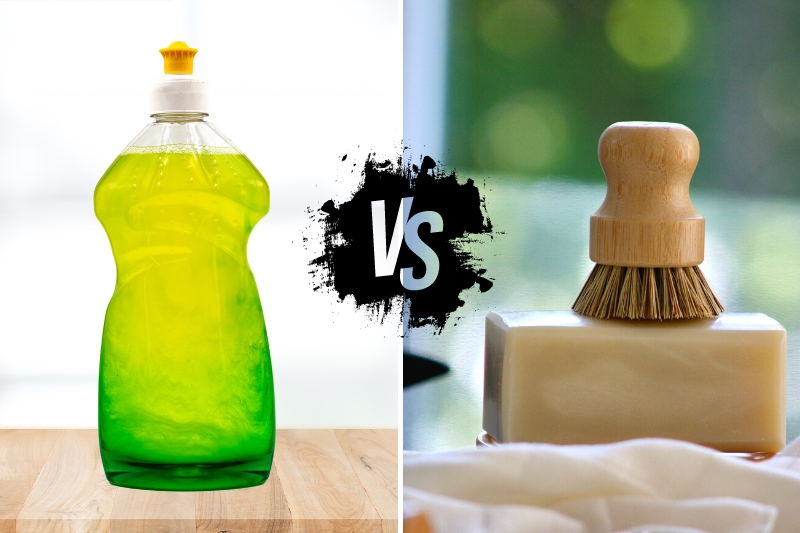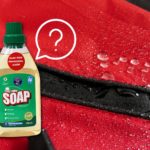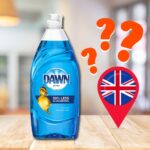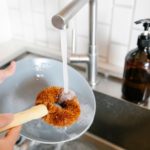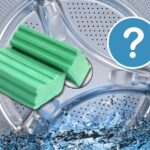The terms “washing-up liquid” and “dish soap” are often used interchangeably to describe the same product. But are they really the same thing?
The simple answer to this question is yes! Dish soap is a term more commonly used in the US to describe what we typically call washing-up liquid here in the UK.
When comparing washing-up liquid in the UK with dish soap in the US, it becomes clear that they are generally the same thing: a liquid detergent that is added to warm water to aid you in hand washing your dirty dishes.
These products contain surfactants that are used to form suds. These suds lift bacteria off the surface of your dishes.
Although this doesn’t kill the bacteria, it does allow them to be washed away, meaning all the grease, food particles, and microbes are removed from your kitchenware.
The only issue with using these terms interchangeably comes when referring to bars of dish soap.
Although these are not yet widely used in households, they do the exact same job as liquid detergent. However, they cannot technically be called a washing-up liquid as they are a solid block of soap.
Instead, they are only known as “dish soap” or, in some cases, a “washing-up liquid alternative.”
Washing-Up Liquid vs. Solid Dish Soap
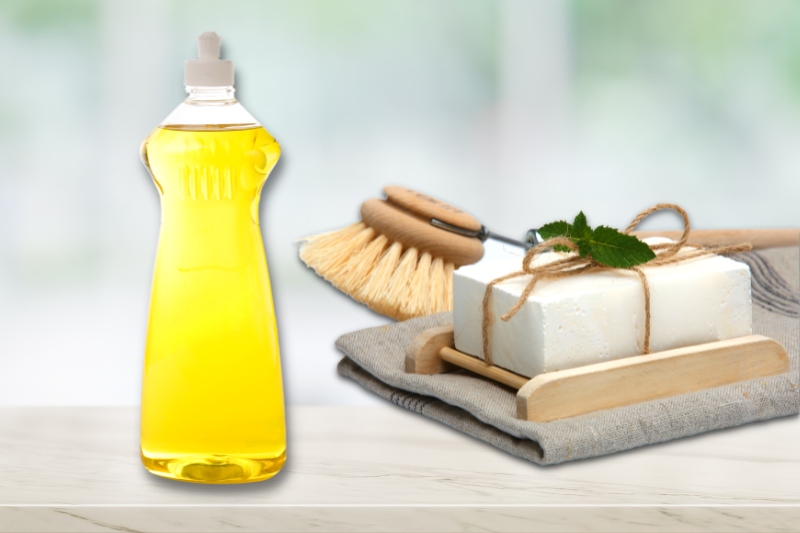
Although dish soap typically comes as a liquid detergent (aka washing-up liquid), solid blocks of soap are becoming more common among those trying to be more eco-friendly.
While they are essentially the same products, each has its benefits and drawbacks. These are each covered below to help you decide if you want to make the switch.
Ease of use
Both washing-up liquid and solid dish soap are straightforward to use.
Liquid detergents can be poured from the bottle onto a wet sponge to create suds, while a solid soap block will need to be rubbed against the sponge to bubble up. The product you find easiest to use is largely down to personal preference.
Environmental impact
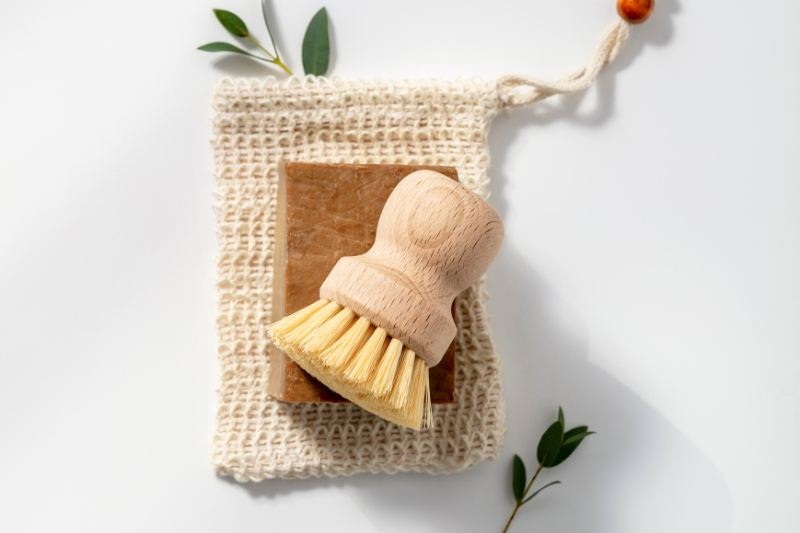
A bar of dish soap is generally considered to be more eco-friendly than its liquid counterparts as they require minimal packaging that is often plastic-free.
The blocks also last much longer and are typically the equivalent of two to three bottles of liquid soap.
However, many refill stores sell washing-up liquid, meaning you can refill your old bottles and reduce your environmental impact this way.
Availability
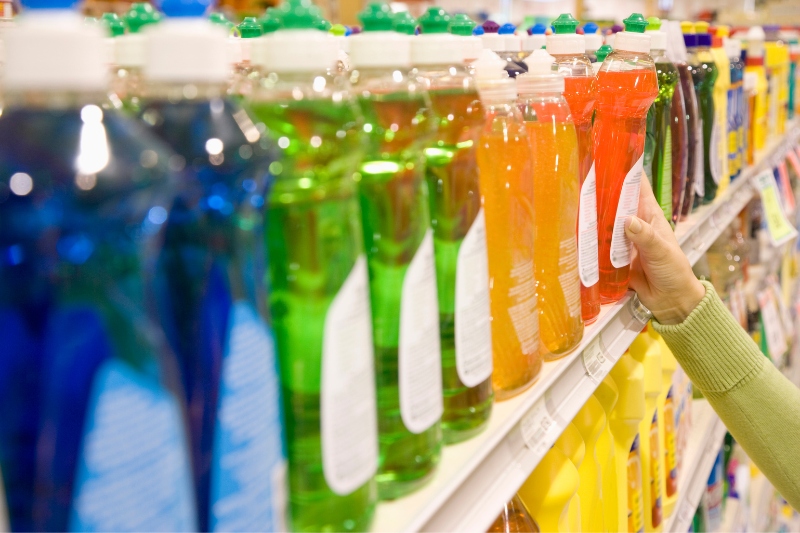
Washing-up liquid is sold in the vast majority of stores and can be bought on a budget.
Dish soap bars, on the other hand, can be hard to find as they are not as commonly used in the UK.
Your best bet is to search for them on websites like Amazon or Etsy, or in a local health store. Alternatively, you can make your own dish soap bars at home.
Skin sensitivity
If you have skin sensitivities, it may be worth looking into purchasing a bar of dish soap.
Although there are bottles of washing-up liquid designed for sensitive skin, bars of soap are typically made with fewer artificial fragrances, phosphates, and chemicals that could trigger an allergic reaction.
Consider dish soap bars if you can’t find a liquid soap that doesn’t trigger an adverse reaction.
Performance
According to experts, washing-up liquid is the best choice when washing heavily soiled dishes or those that have come into contact with raw meat.
This is because a bar of soap and the dish that it sits in are much more prone to becoming contaminated with harmful bacteria that could then be transferred to your kitchenware.
What Is a Good Substitute for Washing-Up Liquid?
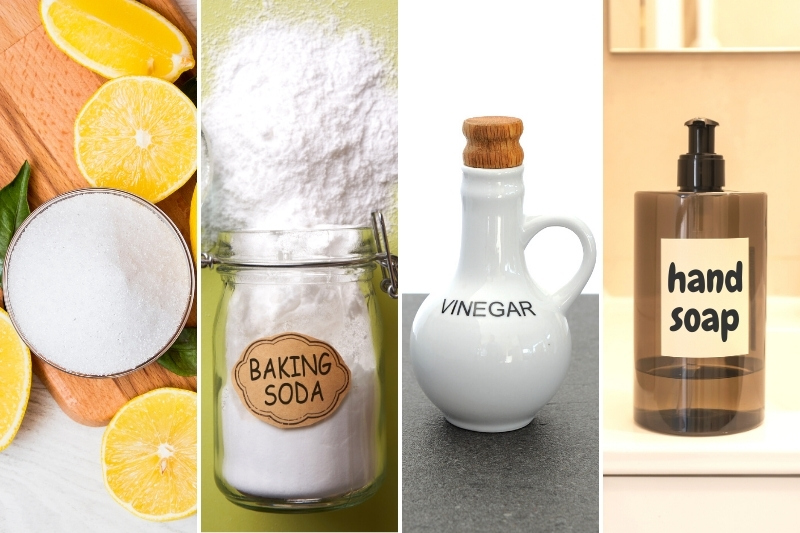
Bars of dish soap are often referred to as a washing-up liquid alternative. However, they’re not the only substitute you can use for clean, sparkling, germ-free dishes.
Some of our favourite substitutes for regular washing-up liquid are listed below:
- Citric acid and bicarbonate of soda: This combination is your best option when substituting washing-up liquid, as it is both antibacterial and mildly abrasive. To use, simply squeeze a few teaspoons of lemon or lime juice into a cup of hot water and then stir in a teaspoon of bicarbonate of soda. This can then be applied to your dishes with a sponge.
- Bicarbonate of soda: Bicarbonate of soda can also be used on its own to clean your dishes. However, it is not antibacterial, so it will not sanitise them. The powder can be sprinkled directly onto the dirty surface and scrubbed with a wet sponge to form a cleaning paste.
- White vinegar: Using white vinegar on your dirty dishes may leave behind a faint smell, but it is great for sanitising them and removing harmful bacteria. For the best results, you will need to dilute a couple of tablespoons in 250 ml of warm water. It can then be wiped over your dishes using a sponge.
- Hand soap: Hand soap won’t be able to cut through grease as well as some of the other alternatives on this list, but it will help to freshen up your dishes if needed. Use a non-scented version wherever possible, and make sure you rinse the dishes well to avoid a soapy aftertaste.
- Natural shampoo: As a last resort, you can also dilute a tablespoon of shampoo in 500 ml of hot water. Just ensure that you thoroughly rinse your dishes to remove all traces. Although any shampoo will work, we highly recommend you only use one made of natural ingredients in case of accidental ingestion from left-behind residue.
When using any of these substitutes, bear in mind that they may not be as effective as your typical commercial cleaner. This means you may have to go over your dishes a few times to remove all the dirt and grime.

Hannah has a passion for cleaning. She worked her way around Australia by cleaning hostels in exchange for free accommodation and used her cleaning skills to bag a job as a chalet host for a luxury ski company in France.
